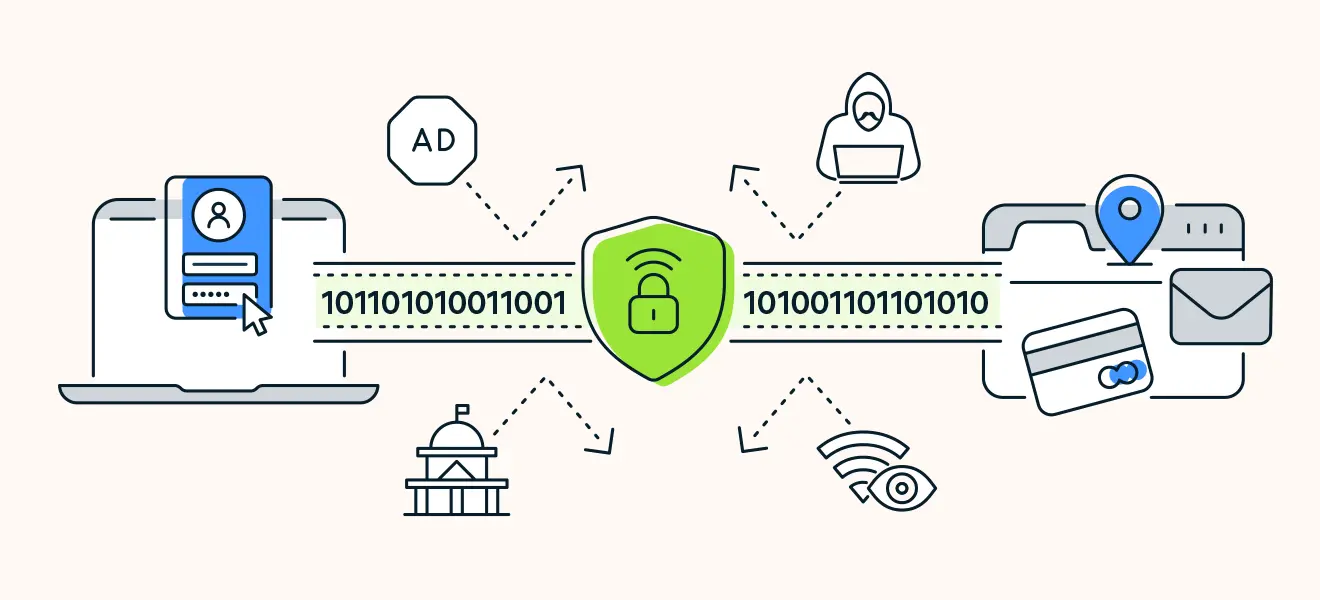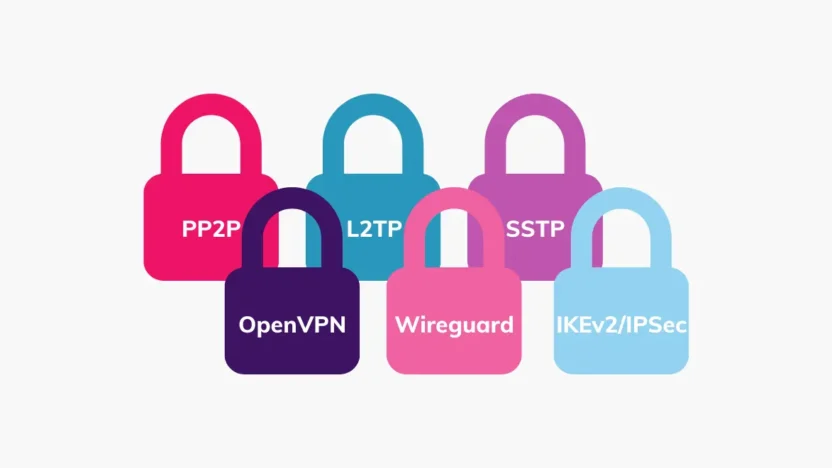When talking about VPNs, many people imagine anonymous browsing and changing IP addresses. However, behind every stable and secure connection is a set of technologies, where VPN protocols and encryption ciphers play a crucial role. The protocol determines how the secure tunnel between your device and the internet is created, while the encryption cipher protects the data passing through this tunnel.
Each protocol offers a different level of security, speed, and flexibility. Therefore, it’s essential to know which one to choose to meet your specific needs. Below is an overview of the most commonly used VPN protocols, their advantages, disadvantages, and recommended use cases.
| VPN Name | Discount and Offer | Trial Link |
|---|---|---|
| NordVPN | 74% discount + 3 months free | Try NordVPN |
| Surfshark | 87% discount + 4 months free | Try Surfshark |
| CyberGhost | 82% discount + 4 months free | Try CyberGhost |
| PIA VPN (Private Internet Access) | 85% discount + 4 months free | Try PIA VPN |
| ExpressVPN | 61% discount + 6 months free | Try ExpressVPN |
1. OpenVPN
Type: Open-source protocol
Description: Reliable, secure, and widely supported
OpenVPN is one of the most popular VPN protocols due to its high level of security and broad compatibility. This protocol is based on open-source technology, meaning that its code is publicly available and can be reviewed by experts to identify any security vulnerabilities.
What makes it unique
- Uses AES-256 encryption, considered one of the most secure encryption standards.
- Works across various platforms, including Windows, macOS, Linux, Android, and iOS.
- Offers a choice between TCP (more stable connection) and UDP (faster transmission).
Disadvantages of OpenVPN:
- More complex manual configuration.
- Can be slower compared to more modern protocols.
Ideal use case: When maximum security is needed, such as accessing corporate networks or bypassing censorship.
2. WireGuard
Type: Modern open-source protocol
Description: Extremely fast, efficient, and simple

WireGuard is a relatively new VPN protocol that quickly gained popularity due to its simplicity and performance. Its source code is significantly shorter than OpenVPN’s, reducing the risk of security vulnerabilities.
Key benefits of WireGuard
- Significantly faster than most other protocols.
- Low CPU usage – ideal for streaming and gaming.
- Easy to install and configure.
Possible drawbacks
- Some VPN services may implement WireGuard in a way that limits anonymity.
Ideal use case: Streaming high-quality video, online gaming, or any activity requiring low latency.
3. IKEv2/IPsec
Type: Combination of protocols
Description: Stable and fast, especially on mobile devices
IKEv2 (Internet Key Exchange version 2) is often combined with IPsec to provide better encryption and higher security. This protocol is known for its ability to maintain a stable connection even when switching networks, such as transitioning from Wi-Fi to mobile data.
Key advantages IKEv2/IPsec
- Excellent stability and speed.
- Great for mobile connections.
- Quickly restores interrupted connections.
Disadvantages
- Suspected to be vulnerable to NSA interception.
- Some firewalls may block this protocol.
Ideal use case: When frequently switching between networks, such as during travel.
4. SoftEther
Type: Cross-platform open-source protocol
Description: Flexible and effective for bypassing censorship
SoftEther is a universal VPN protocol offering high compatibility and flexibility. It can emulate various other protocols and is known for its ability to bypass strict firewalls.
Advantages
- Capable of bypassing firewalls and censorship.
- High-speed data transfer.
- Supports multiple encryption algorithms.
Disadvantages
- Not supported by all VPN providers.
- Configuration can be more complex.
Ideal use case: Connecting in countries with strict censorship and restrictions.
5. L2TP/IPsec
Type: Combination of protocols
Description: Older but still commonly used
L2TP (Layer 2 Tunneling Protocol) is often paired with IPsec to ensure secure data transmission. Although this protocol is widely available, its security has often been questioned.
Advantages
- Easy to set up.
- Broad compatibility across devices.
Disadvantages
- Slower than WireGuard or OpenVPN.
- Suspected vulnerability to government surveillance agencies.
Ideal use case: When modern protocols are not available.
6. SSTP
Type: Proprietary protocol by Microsoft
Description: Suitable for Windows systems
SSTP (Secure Socket Tunneling Protocol) was created by Microsoft and is integrated directly into the Windows operating system. It uses port 443, making it difficult to block by firewalls.
Advantages
- Excellent for bypassing firewalls.
- Native support in Windows.
Disadvantages
- Limited compatibility with non-Windows systems.
- Potential vulnerability to man-in-the-middle attacks.
Ideal use case: Connections on Windows systems in restricted environments.
7. PPTP
Type: Outdated protocol
Description: Fast but highly insecure
PPTP (Point-to-Point Tunneling Protocol) was one of the first VPN protocols and was popular due to its simplicity. However, it is now considered outdated and highly insecure.
Advantages
- Quick and easy setup.
- Fast connection.
Disadvantages
- Weak encryption that is easily breakable.
- Not suitable for sensitive operations.
Ideal use case: Only in rare situations where security is not a priority.
Encryption Ciphers
Encryption ciphers play a crucial role in protecting the data traveling through the VPN tunnel. The strength of encryption depends on the length of the encryption key – the longer the key, the higher the level of security.
Most common ciphers
- AES (Advanced Encryption Standard): Uses keys of 128, 192, or 256 bits. AES-256 is one of the most secure options available.
- ChaCha20: A modern and fast cipher, particularly efficient on mobile devices.
When selecting a VPN service, it’s advisable to choose one that supports AES-256 or ChaCha20 encryption – these ciphers provide the best balance of speed and security.
VPN Protocols Comparison Table
| Protocol | Type | Key Features | Advantages | Disadvantages | Ideal Use Case |
|---|---|---|---|---|---|
| OpenVPN | Open-source | Reliable, secure, widely supported | Strong AES-256 encryption, supports TCP and UDP, works on multiple platforms | More complex to set up manually, slower than newer protocols | Maximum security for sensitive data and bypassing censorship |
| WireGuard | Modern open-source protocol | Extremely fast and simple | High speed, low CPU usage, easy configuration | May store IP addresses during sessions if not configured properly | Streaming, gaming, and low-latency activities |
| IKEv2/IPsec | Protocol combination | Stable and fast, especially for mobile | Maintains connection during network changes, excellent for mobile use | May be vulnerable to NSA surveillance, blocked by some firewalls | VPN for mobile devices and travel |
| SoftEther | Cross-platform open-source | Highly flexible and compatible | Bypasses firewalls and censorship, high-speed data transfer | More complex setup, not supported by all VPN providers | Accessing content in restricted regions |
| L2TP/IPsec | Protocol combination | Basic and widely available | Easy to set up, compatible with most devices | Slower than newer protocols, possible vulnerabilities | Basic VPN connection where modern protocols are unavailable |
| SSTP | Proprietary (Microsoft) | Integrated into Windows | Bypasses firewalls, native support in Windows | Limited compatibility with non-Windows systems, potential man-in-the-middle attacks | Windows systems in restricted environments |
| PPTP | Outdated protocol | Fast but insecure | Quick and simple to set up, fast connection | Weak encryption, easily breakable, unsuitable for sensitive data | Only for non-critical operations |
Conclusion
The right VPN protocol can significantly impact your connection experience. OpenVPN provides robust security, WireGuard delivers lightning-fast speed, and IKEv2/IPsec excels in connection stability. If bypassing censorship is your priority, SoftEther is the way to go.
Additionally, pay attention to the encryption ciphers – AES-256 and ChaCha20 ensure your data remains protected even on public Wi-Fi. Choose a protocol that matches your needs, and enjoy a secure and fast connection wherever you are.




